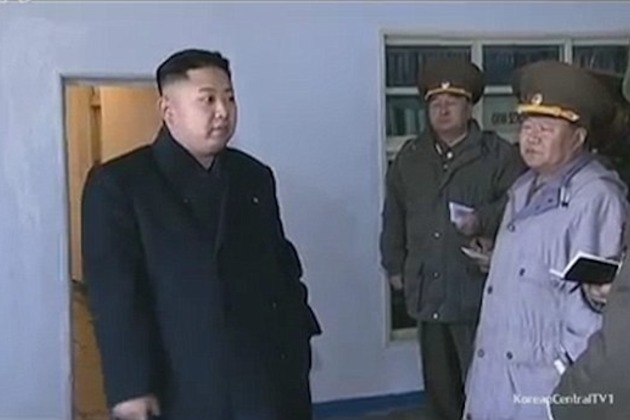North Korean leader has launched a spy-hunting operation after seven out of eight missile tests failed
Birmingham Star Monday 31st October, 2016

• Kim Jong Un said to believe that there’s a connection between espionage and the failures
• North Korea has test fired Musudan missiles eight times and has failed seven times
• Investigation to focus on possible plot involving imported missile components
PYONGYANG, North Korea - It surely must be difficult being an elusive nation, but remaining one for long, comes at a cost.
For North Korea, that is ruled by its supreme leader Kim Jong Un, doubts of suspicion are even higher after it issued an open warning to its neighbour and long-time rival South Korea and also its ally the United States.
North Korea has managed to stun the world with his nuclear ambition and its recent progress has caused fears to grow across many Asian nations. With two nuclear tests conducted this year, it has managed to draw international ire from several nations - however, with seven out of its eight missile tests failing - the North has grown very suspicious and now, Kim Jong Un wants to uncover the reason behind the failure.
Between April 15 and October 20, North Korea has test fired the Musudan missiles eight times, but only the launch on June 22 recorded success.
The Musudan missile, with a design range of 1,500 to 2,500 miles, is believed to be capable of reaching South Krea, Japan and even the U.S. territory of Guam.
However, Kim Jong Un hailed the success of the single Musudan success in June after it flew 250 miles into the Sea of Japan, claiming that it was proof of North’s ability to strike U.S. bases across ‘the Pacific operation theatre.’
Fearing sabotage and to understand the problem that might be affecting Jong Un’s plans from inside the country - the leader is said to have launched a nation-wide spy-hunting operation.
He also wants to find a link between espionage and the missile failures, the North Korea Intellectuals Solidarity (NKIS) said.
The leader reportedly suspects that some failed launches may stem from covert actions by the United States Central Intelligence Agency (CIA) and South Korea’s National Intelligence Service (NIS).
The investigation currently is said to be focussing on the imported missile components, including the integrated circuit chips that are part of the flight control system.
North Korean defector and the head of NKIS, Kim Heung-kwang said at a press conference, “Kim has instructed the special investigation team to implement a probe into the national defense sector starting on November 1 to make the causes for the launch failures clear. Officials and workers who engaged in the launches of the missiles are now banned from travelling and their mobiles phones are confiscated to check their conversation records.”
He added that the 60-member special team investigating the issue will be led by North's State Security Minister Kim Won-hong.
Further pointing out, “The North imports the integrated circuit chips due to the failure of 100 percent local manufacturing. It’s a big problem if the U.S. and South Korea are found to be involved in the [power] supply line of integrated circuit chips and devised a plot to cause trouble.”
Meanwhile, South Korea, Japan and the U.S. have vowed to tighten the noose around North Korea as the last resort to force the country to stop expanding its nuclear arsenal.
U.S. President Barack Obama recently said any talks with the North are conditional on Pyongyang first making some tangible commitment towards denuclearisation.
In the wake of Pyongyang's missile test last month, which was its biggest till date, senior leaders from the U.S., Japan and South Korea recently also held trilateral talks in Tokyo in an effort to tackle North Korea's mission to develop its nuclear arsenal.
U.S. Deputy Secretary of State Antony Blinken, South Korea’s Vice Foreign Minister Lim Sung-nam and Japan’s Deputy Foreign Minister Shinsuke Sugiyama agreed to work together to put more pressure on the reclusive country to abandon its nuclear programme.
Blinken said, “We will not accept North Korea as a nuclear state. We will not accept North Korea’s possession of nuclear weapons, period. We are focused on increasing the pressure on North Korea with one purpose: to bring it back to the table to negotiate in good faith. Denuclearisation. That is the objective."
North Korean provocations this year include two nuclear tests and the launch of 24 ballistic missiles. The country has shown no willingness to engage in dialogue on the nuclear issue, and therefore, Washington’s diplomatic efforts have focused on engaging other nations to isolate North Korea and strictly implement the international sanctions.
China, North Korea's lone major ally, and Russia have also pushed for a resumption of six-party talks on denuclearisation in North Korea. The talks, which also involve the United States, Japan and South Korea have been on hold since 2008.
And despite all the divisions and conflicts among nuclear countries, there is one thing that unites them – their nuclear weapons. Russia and the U.S., India and Pakistan, North Korea and Israel, along with China, France and the United Kingdom are working to avoid a resolution calling for a global conference to establish a binding “legal process” to ban the manufacture, possession, stockpiling and use of the weapons. The resolution, which is non-binding, could win as many as 120 votes in the 193-member UN General Assembly.
© 2000 - 2016 Birmingham Star - Midwest Radio Network Pty Ltd. - (LU) A division of Big News Network. All rights reserved